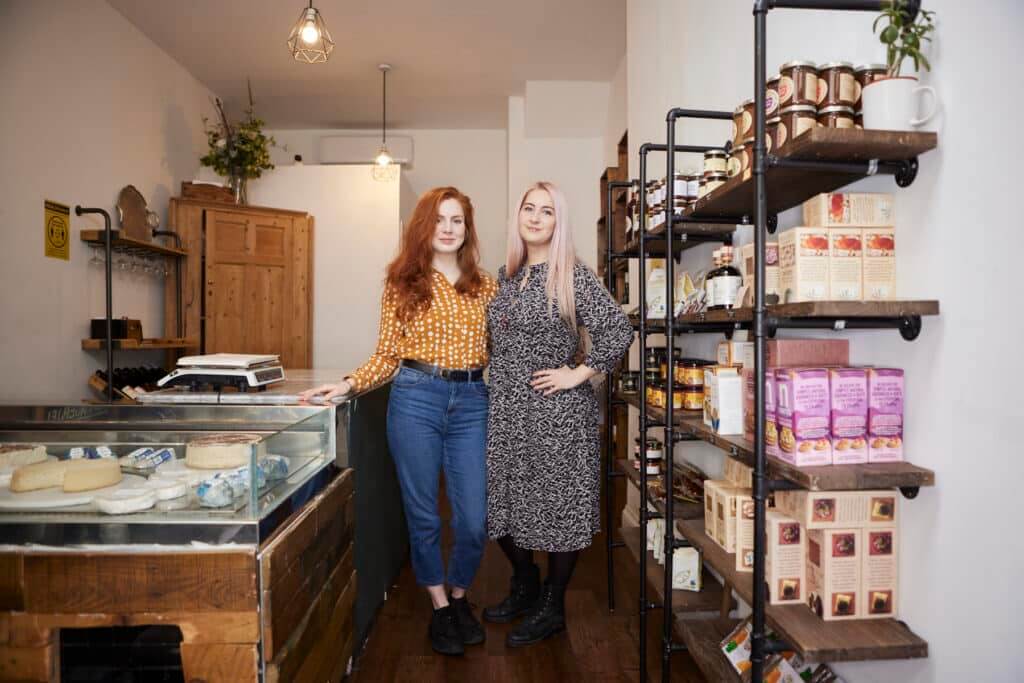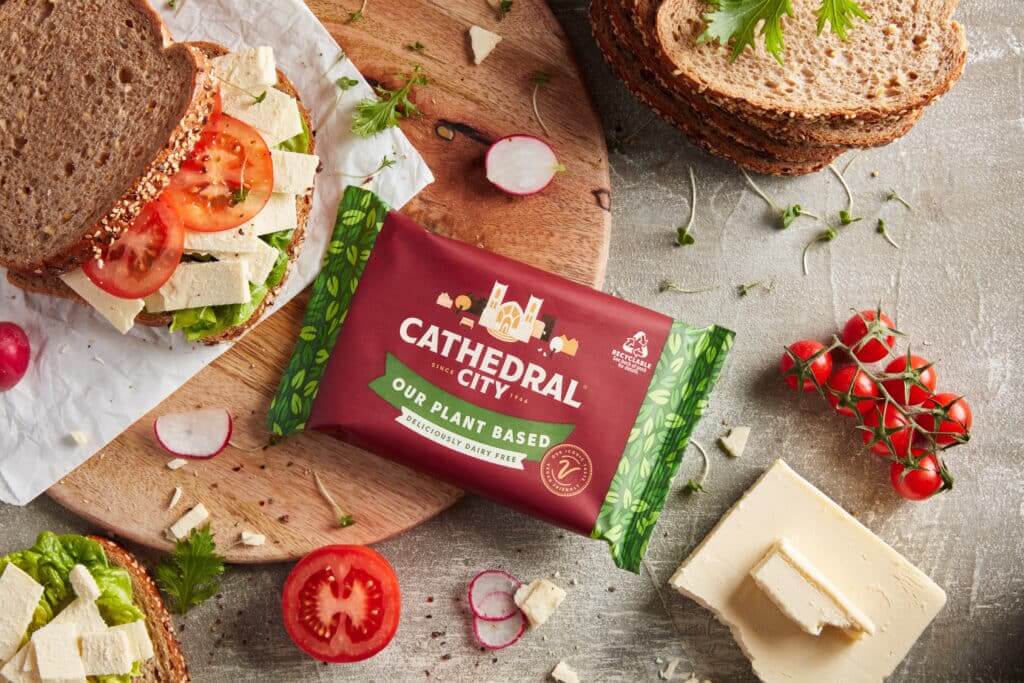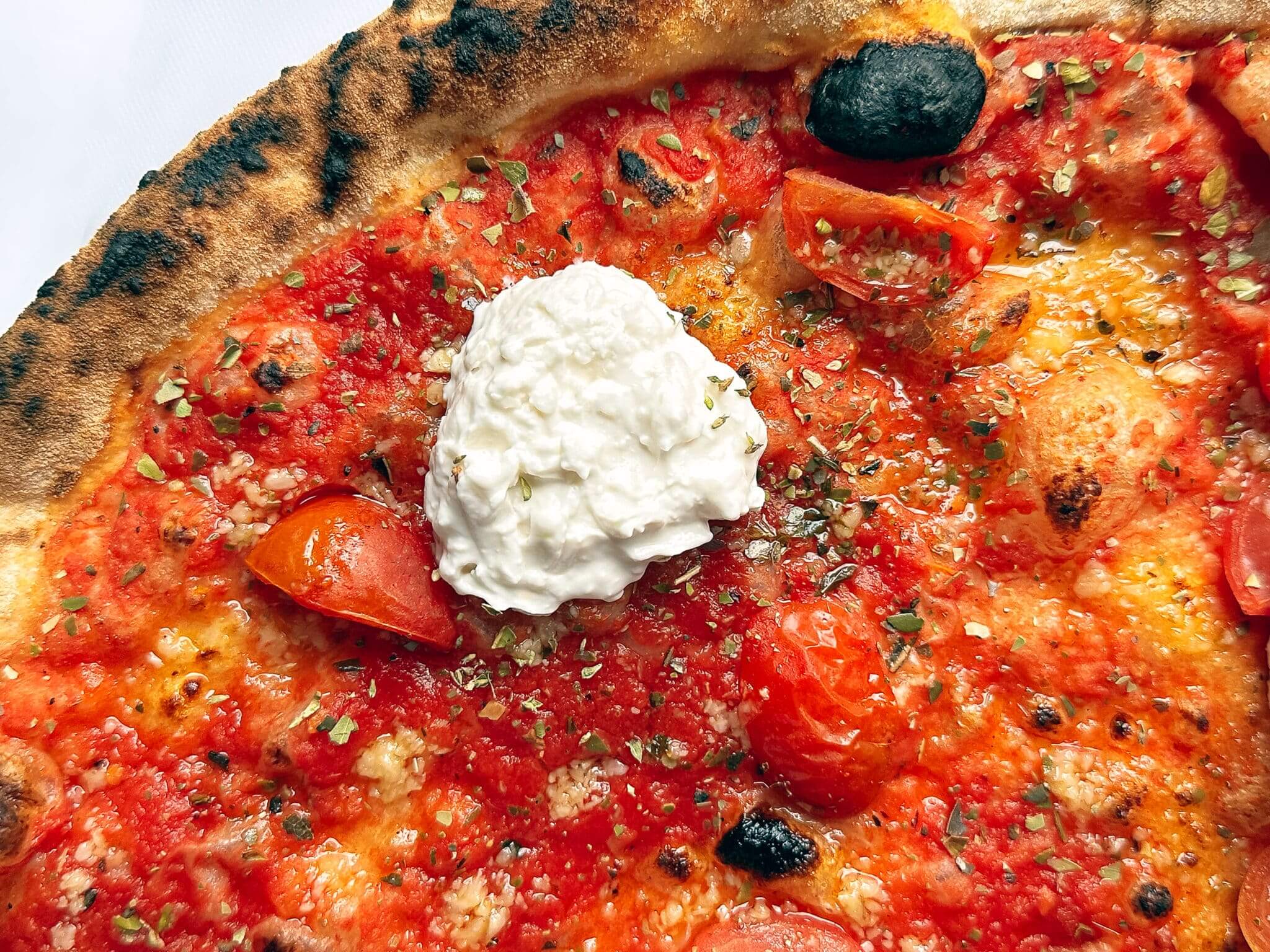La Fauxmagerie in London looks like any cheesemongers – there’s soft cheeses, ricottas, parmesans – except here, everything’s vegan. “Most of our cheeses are made for cheeseboards,” says Emily Kelly, community manager at La Fauxmagerie, as she hands me a sliver of Shoreditch Smoked. I can’t help but want and compare it to dairy cheese, only to be stumped – this is something unique. Kelly serves me a nibble of Balham Blue, made from almond and sweet potato, and I’m immediately impressed by the resemblance to dairy blue cheese; it has a great funk. With the Brick Lane Bree, made from almond and shea butter, the dairy comparisons are gone again, while the use of penicillium candidum adds the requisite brie rind, it’s a complex, bright flavour that defies categorisation.
Everything people used to say about non-dairy cheese – that it’s rubbery and sad – appears to be history. Modern plant-based cheese isn’t just for those avoiding dairy anymore, but a standalone product that competes on flavour; Kelly tells me their cheeses also appeal to customers who are flexitarian, lactose intolerant, pregnant or looking to reduce their cholesterol. In the UK, seven per cent of households buy vegan cheese, meaning it’s not just the 0.8 per cent who’re vegan. The UK vegan cheese market is now worth £40.2 million, which is positive when considering how vegan food has a much smaller climate footprint than dairy. But ethical concerns remain, casting a shadow over vegan cheese’s sustainability credentials.
Plant-based cheeses appeal to customers who are flexitarian, lactose intolerant, pregnant or looking to reduce their cholesterol. Emily Kelly, community manager at La Fauxmagerie.
La Fauxmagerie estimates their cheese emits 95 per cent less greenhouse gas and uses 89 per cent less water than dairy cheese; simply avoiding the energy-intensive process of growing a cow for milk is a solid head start in the climate stakes. But as vegan cheese is primarily made from nuts like almond, coconut and cashew, it does come with humanitarian concerns: these nuts are often harvested by people working in dangerous conditions, earning very low wages.

“Vegan products are often scrutinised on their ethics to a greater extent than their dairy equivalents. And why not? It’s a challenge vegan companies can definitely rise to, not least because the dairy industry has set such a low bar,” says Jasmine Owens, a writer, researcher and director at Ethical Consumer, whose rankings of UK vegan cheeses found large sustainability discrepancies across the sector.
As with any product that’s widely produced, Owen says that differences in quality and ethics is to be expected: “What’s important is that consumers do their research, [and] support companies with strong ethical practices and avoid those doing damage.”
In the UK, seven per cent of households buy vegan cheese, meaning it’s not just the 0.8 per cent who’re vegan. Source: Kantar Grocery and AHDB
Small producers like La Fauxmagerie, available from Waitrose cheese counters, score highly on ethics as well as flavour. “We’ve received five star reviews on La Fauxmagerie’s Brixton Blue and Shoreditch Smoked, which is a testament to the improvements made in the texture and taste of vegan cheeses,” says Carly Stage, a cheese buyer at Waitrose. “Products like La Fauxmagerie allow our shoppers to support smaller, artisanal brands which pride themselves on their sustainably credentials.”
But what about the pre-packed, cheddar-style blocks competing for our sandwiches and cheese-topped dinners? The provenance of these ingredients is often less clear, leading to questions about sustainability.
When Cathedral City, the UK’s best selling cheese, added a coconut-based cheddar to its roster last autumn, vegans rejoiced; the flavour is exceptional and it melts beautifully. Vegan cheese is scientifically challenging, and the new Cathedral City is the result of lengthy experimenting of different ingredients and technologies: “Some ingredients that improve texture or meltability can have a negative impact on flavour. […] Cheddar also has different notes when eaten cold [or] cooked,” says Neil Stewart, head of marketing for Cathedral City at Saputo Dairy UK. “We were adamant our plant-based needed to taste, look and feel as close to [dairy] cheddar as possible.”
Saputo Dairy did not respond to questions about how they source the coconuts, leaving us with Ethical Consumer’s less than stellar sustainability ranking. But in light of the climate crisis, should we really be knocking a non-dairy cheese that can please even strident dairy lovers?
Saputo Dairy did not respond to questions about how they source the coconuts, leaving us with Ethical Consumer’s less than stellar sustainability ranking.

“Cheese is often the hardest thing to give up, and for many vegans it’s the last animal product removed from their diet,” says Maisie Stedman, spokesperson for The Vegan Society. She views the popularity of Cathedral City Plant Based as positive for “opening up the market to a larger number of people who may not have otherwise considered giving up dairy”. Stedman is sympathetic to the difficulty in adjusting after a lifetime of eating certain foods: “Alternatives [that more closely resemble dairy] allow people to enjoy familiar dishes without compromising their values of kindness and compassion.”
We don’t make vegan burrata. Burrata is a product with its own culture and history, and a specific way of creating it using animal ingredients. We make Burella. Axel Katalan, founder of plant-based brand Julienne Bruno.
Nowhere on plant-based food brand Julienne Bruno’s packaging does it say ‘vegan’. And founder Axel Katalan tells me this is deliberate: “We don’t make vegan burrata. Burrata is a product with its own culture and history, and a specific way of creating it using animal ingredients. We make Burella.”
Though the process is not dissimilar. Like any dairy, Julienne Bruno ferments the ingredients; the word ‘cheese’ itself derives from ‘kwat’, meaning to ferment or become sour. The company opted to use coconut because of how its fat content mimics dairy, and chose soy for its protein content and long tradition in Asia. The brand’s ethics credentials are strong too: the organic ingredients are fully traceable, and Katalan says they’re in the process of securing B-Corp accreditation.
But in order to truly compete with dairy, vegan cheese can’t just be the better ethical choice, it has to taste great. “From a mass consumer perspective, if it doesn’t taste good, nobody’s going to buy it,” says Katalan, whose products are sold at Whole Foods, Ocado and in restaurants. The goal is to win people over through “seduction and gastronomy”, not confrontation: “We want to create products that people love, not because it’s vegan, but because it’s a good product.”









It always surprises me that vegans choose to eat often highly processed food which resembles meat and dairy products and uses ingredients that are often imported.
it always surprises me what non vegans are surprised by…..
…..and meat eaters don’t I suppose. Why would it surprise you that some vegans eat processed food? Meat eaters eat processed foods too but you haven’t mentioned that. We’re not all puritans you know.
Vegan food requires more land and as a result more insecticides and pesticides are used, a report was made stating that 26 million birds were killed one year as a result of these poisons. Another negation is the lack of complex vitamins and minerals that are only found in meat, as a result one has to purchase supplements that are synthetic and sold in plastic cases. A balanced diet requires all the food groups, as a past vegetarian I joined the military and the physical demand made it impossible not to eat meat so I relented and started eating it again and needless to say I was kept fuller for longer. A plant based diet means you end up eating all the chemicals in the plant whereas in an animal that would be stored in organs that people don’t normally eat. Lastly, from a religious perspective everything on this Earth has a purpose, by denying an animal the right to provide meat to humans and other lifeforms is injustice and oppression. It is the spirit that is everlasting not the carcass. A final thought did you know there are now cricket farms and mealworm for protein alternatives? I have yet to meet a vegan that is against that for some reason.
Hi! I was a vegetarian for 10 years but I now eat meat twice a month from a local, regenerative farmer. I also work in agroecology. (Just to give some background to my knowledge/bias!) I was wondering if you could share a source for the claim that vegan food requires more land, and more insecticides and pesticides? From all the studies and examples I’ve read (e.g. from Feeding Britain from the Ground Up), I have seen evidence to show that the more plant-based food we eat, the less land is associated with our diet (mostly because the majority of all crops feed animals or make biofuel, not people). In terms of pesticides and insecticides, this seems to depend more on the system (organic vs conventional) rather than the food type (veggies or meat). I’d be happy to learn more and if you can share a source for your ideas, I’d love to read it. Thank you!
Is this comment real? Are you genuinely trying to imply that animals are sentient enough to understand that their role in life is to provide food for humans and furthermore, would be offended if you didn’t eat them? Please!
Batool: Had to check that it wasn’t 1st April when I read “from a religious perspective” etc. Approx one billion chickens are slaughtered for food yearly in the UK alone, having often been raised in appalling conditions, but of course we wouldn’t want to “deny an animal the right to provide meat” would we?
Oh my goodness where to start with this? I’m afraid you are simply wrong in your ‘facts’, Batool. There is masses of research out there to show that a vegan diet uses MUCH LESS land (have a look at the articles from Oxford and Harvard on the Vegan Society website for references; usually the figures quoted are anywhere between 10 and 20 times less land).
Another factor that you ignore is that the animals you eat are herbivores, who will have eaten those same pesticides and herbicides in very large quantities in the plants they ate – it takes much more plant material to produce 1 kg of eg beef protein than to eat 1 kg plant protein direct. (And we have the choice of eating organic either way, which is presumably why you are on this website.)
I’m one of those many vegans who cooks their own food from scratch, growing most of it organically. I’m not sure how many of us are in favour of mealworms and crickets as food; they barely touch my consciousness as a serious alternative.
As a vegan I have no problems with getting enough vitamins and minerals. It’s B12 that we especially need to look out for, and that’s found in yeast extracts and yeast flakes.
Indeed, everything on earth has a purpose, but, like Pam B below, I cannot believe that animals were put on this earth for our appetites, especially since the relationship is hardly consensual. That is an incredibly human-centred viewpoint. I think it was Alice Walker who said that animals are not here for humans any more than woman are here for men or black people here for white. There is also the fact that the animals we farm to prey upon vastly outnumber the wild creatures on this planet, and are mostly kept in appalling conditions in which they suffer.
You might perhaps want to have a look at the findings in this very recent piece of research from Oxford:
https://www.sciencealert.com/oxford-scientists-confirm-vegan-diet-is-massively-better-for-planet
Well Batool, you are just about to meet a vegan against breeding insects or any creatures who will suffer in order to give us food we do not need. For some, I accept there may not be alternatives to meat or insects, but for me, in the West I do not need to eat this food. The way I think is that if I would not want it done to me, why would I inflict it on another defenceless creature? Fortunately, I was taught that I can get all the good protein and nutrients I need from plant based food, with a little help from B12 supplements. I wonder if you are aware that most people who consume a high meat diet are far more likely to suffer chronic diseases than those who do not. Meat lacks some nutrients, such as fibre, polyphenols, vitamin C and other antioxidants. It would be helpful for me to know the source of your information, which peer reviewed references you might use. I would be grateful if you would put them in the comments for all of us to see. Thank you.
I have eaten ‘cheese’ from La Fauxmagerie when occasionally visiting their shop. Tastes just lovely. I find some of the comments about plant based vegan diets interesting. Vegan’s seem to get lumped together. All eating highly processed vegan junk food. People eating a more omnivorous diet, by implication seem not to. But as i watch people this does not seem to be the case. Some eating a very limited diet with very few veggies whilst others enjoy a more varied, and therefore healthy diet. Vegans don’t, at least this one, eat Avocadoes every day, and almonds, a few. As for damaging the planet, the impact of a heavy meat diet has repeatedly been shown to be doing lots of harm with much (some say 86%) of the forests being cut down for GM Soya to feed to all the animals, including fish, that are in fact damaging the planet and driving Wildlife to a meagre 6% of mammals on the planet. A diet consisting of 30 plants a week would be more in order.
As far as nutrients are concerned there is so much advise out there, with people saying you’re missing this or that on such or such a diet. People seem to be deficient on various thing on many sorts of diet. I try to be practical and observing some of the biggest land animals on the planet ie gorilla, giraffe, rhino, they seem to do pretty well just eating plants!
I’m not vegan but have been chipping away at the animal products I consume that are both high inpact on the environment and detrimental to my health by increasing inflammation. I count red meat, dairy and eggs in those two categories.
I have noticed less muscle pain since quitting them one at a time. I did go through a fad phase with grocery store vegan cheese, but got fed up with the boring, identical ingredients. Yes, one can find more interesting cheeses out there (Thanks for highlighting them, Riverford!) but these can be pricey.
So I started making my own. First imitating the store cheese by fermenting coconut milk with juice from homemade saurkraut, then heat-thickening it into a cheese.
I also fermented ground cashews with miso as a cold cheese alternative. Another method is to sprinkle probiotics into thick homemade soymilk and when it’s bubbly with life, cook that up with salt, garlic and herbs for a cheese sauce.
I have also been happy with using chia seeds as a substitute for eggs in baking.
There are so many ways to experiment and come up with nutritious and affordable vegan alternatives to the foods we thought we couldn’t live without. I, for one, feel better for it.
Great tips, thank you Ani. I tried a cheesemaking ‘kit’ but the results were dire. I’ll try these. Living in France makes it hard to get hold of vegan ‘cheese’.
Sounds great, thanks for sharing Ani.
Wow, I bought the Brixton Blue as Waitrose now stock this cheese and it is truly amazing!
Tastes better than I remember Stilton tasting- a true work of art. Not at all processed, only has a few ingredients. La Fauxmagerie have really nailed this. Awesome!